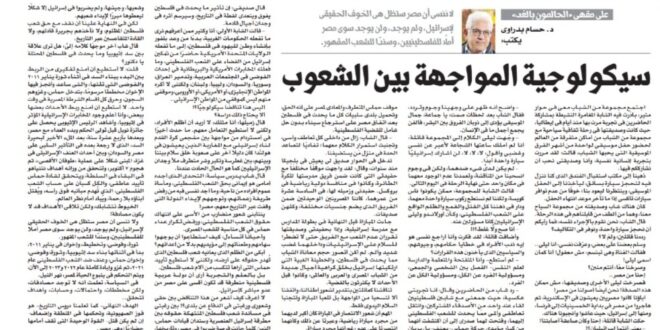The Psychology of Confrontation Between Nations
By Hossam Badrawi
A group of young people gathered with me for an engaging conversation. A young, adventurous, and active woman shared a recent experience she had in Italy. She and her friend had been on a cultural tour with a group of young people from around the world, attending a concert by one of the most popular bands.
She said:
“I went through a deeply human and psychological experience. My friend and I went to the hotel reception to book a car with a driver to take us to the concert and wait to take us back, as we were worried about the lack of taxis late at night. There was a young man and his girlfriend from the tourist group with us, two of the nicest people we’d met on the trip.
The young man said: ‘We’re doing the same thing. Why don’t we share a car and split the costs?’
We replied: ‘Why not?’
We introduced ourselves, and I said, ‘I’m Laila.’ The girl smiled and said, ‘No way! My name is Laila too!’ We both exclaimed, ‘Where are you from?’
‘We’re from Egypt.’
The other Laila and her friend then screamed in amazement: ‘No way! We’re originally from Egypt too! Our parents lived in Alexandria, but they left Egypt in the early 1950s, moving to France and then to Israel, where we were born & raised up.’
Our Liaila continued: “It was as if we were struck by lightning. , ‘So you’re Israeli?’”
The unease and hesitation were clearly visible on our faces, prompting the young man to say after a moment of silence, “Guys, the beauty of music dissolves differences between people; art brings out the best in humanity.”
Laila turned to , and said, “At that moment, I didn’t have the courage to express my anger and said to myself, ‘No,No No, I will never share a car with an Israeli.’ It wasn’t anything personal against them, but we withdrew from the conversation and avoided being with them for the rest of the trip.
She added: “Maybe they are good people, but we couldn’t bring ourselves to share a car with them. Thoughts of the oppression, killings, and suffering inflicted on the Palestinian people kept running through our minds, as if Orlando and Israeli Laila were personally responsible for it all.”
Ahmed , a young man in the group then shared a contrasting experience. He had met two Palestinians through a mutual friend and sympathised with their plight. However, he soon discovered that they were staunch supporters of Hamas, even viewing the Hamas extremist stance toward Egypt as justified.
Ahmed continued: my feelings were torn between my sympathy for the Palestinians and readiness to die with & for them and the anger from the hatred to Egypt and the desire to punish the only country that had made such a sacrifice for the Palestinian case.
One of my friends, who has lived in Belgium for years, shared a different story. His granddaughter was part of a school volleyball team participating in an international tournament. She and her Egyptian friend were the only Egyptians on the team, which was made up of various nationalities. The semi-final match was against an Israeli school team , and my granddaughter and her friend initially decided not to play to avoid shaking hands with the Israeli players. The families discussed this and ultimately encouraged the girls to play without making physical contact.
The friend added: “The impact of what happens in Palestine goes beyond a historical moment. It shapes the identity and psyche of future generations.”
Laila , who started sharing her story , then expressed her view on Western governments’ actions, from the Balfour Declaration to current U.S. support of Israel’s actions in Palestine. She explained that, while she harbors resentment toward the actions of the west who created the whole conflict yet , her feelings don’t extend to British or American citizens. “Isn’t that a psychological contradiction?” she asked. “Doesn’t it require study?”
Why do I feel that way to Israelites in particular?!!!
Samy , Another young man, a political science student, described his internal conflict. He believes in the Palestinian cause, but he struggles to reconcile his empathy for the Palestinian people with his disapproval of Hamas’ actions, especially when those actions are directed against Egypt.
The discussion took a turn toward global politics when Hassan ,another young man asked me, “Doctor, do you see a connection between Ethiopia’s dam project & the threat to the main artery to life of Egyptians , River Nile and what’s happening in occupied Palestine?”
I replied, “I can’t help but see a link between the start of construction of the dam during the chaos of Egypt’s 2011 revolution and subsequent interference by Hamas. I also see an Israeli intelligent influence in Ethiopia and remember the Ethiopian Prime Minister receiving a Nobel Prize for peace before he even took office. I cannot ignore the suspicion that these events may be interconnected, with the ultimate goal being control of Egypt’s lifeblood: the Nile River.
History teaches us that there are no coincidences in politics. Plans, probabilities, calculations, and goals all converge. The ultimate aim, as history has shown us, is the dominance of Zionism and the weakening—if not the dismantling—of the only civilisation in the region that can stand up to it: Egypt.”
 Dr. Hossam Badrawi Official Website
Dr. Hossam Badrawi Official Website


